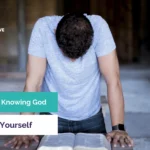As someone who has spent years in Christian ministry, I’ve had the opportunity to sit across the table from countless people, from new graduates to C-level executives, who all ask the same question: “What is God’s purpose for my life?“
I remember a time in my own life, even while working in a job I loved, when I felt a deep, nagging ache. I was busy and productive, but I would often sit in my car and just ask, “God, is this it? Is this the full extent of what you have for me?”
That feeling of confusion is not a sign of a weak faith; it’s the cry of a heart designed for a God-given purpose.
In our world, we are told to “find our passion” or “build our brand.” But these pursuits often leave us empty. As Christians, we have a different path. The most profound and lasting calling isn’t found in a personality test or a career seminar. It is found in the quiet, consistent act of discovering purpose through prayer.
This is not about a magic formula. It is a relational guide to finding God’s will. It’s a 5-step framework, built entirely on the Bible, for moving from confusion to clarity in your God-given calling.
Surrender Your Will in Prayer to Find God’s Plan
The first step in discovering purpose through prayer is often the hardest. We tend to come to God with our own plan. We pray, “God, please bless my plan to become a teacher,” or “Lord, make my business successful.” We present our will and ask for His stamp of approval.
But true, purpose-driven prayer begins with surrender.
Before we can find God’s plan, we must be willing to let go of our own. The ultimate model for this is Jesus in the Garden of Gethsemane. Facing the cross, He prayed, “Father, if you are willing, remove this cup from me. Nevertheless, not my will, but yours, be done” (Luke 22:42, ESV).
This prayer of surrender is the key that unlocks direction. It changes our heart’s direction from “What do I want?” to “God, what do You want?”
Apostle Paul tells us not to be conformed to the world but to “be transformed by the renewal of your mind, that by testing you may discern what is the will of God, what is good and acceptable and perfect” (Romans 12:2, ESV). Prayer is the engine of that renewal. It changes us first, making us capable of seeing His will.
Listen for God’s Voice with an Open Bible
Prayer is not a one-way thing (monologue); it is a dialogue (between you and God). We speak to God, but then we must be still and listen for His voice. But how do we hear from God?
While God can speak in many ways, His primary, and oftentimes, most reliable, method of communication is through His Word – the Bible.
You cannot expect to find God’s will if you are not engaging with His words. Praying for guidance without opening your Bible is like asking for directions and then refusing to look at the map.
In Psalm 119:105, the psalmist writes, “Your word is a lamp to my feet and a light to my path.” Notice the imagery. A lamp for your feet doesn’t illuminate the whole five-year plan. It shows you where to take your next step safely.
As I pray about a decision, I also immerse myself in the word of God. God will use a passage, a story, or a command to provide principles for my life. Here is a critical truth: God will never give you a “purpose” or “calling” that contradicts His word. The Word of God is the filter for all our feelings, impressions, and ideas. This is how we practice discerning God’s will.
Pray for Wisdom to Discover Your God-Given Gifts
God is an intentional creator. He did not make you by accident, and your purpose is not random. The clues to your specific calling are often hidden in plain sight, in the unique design He gave you.
This is why a crucial part of discovering purpose through prayer is asking for wisdom to see yourself the way God sees you.
The bible makes a comparison between natural talents (like music, art, or organization) and spiritual gifts (like healing, prophecy, wisdom, faith etc). We are called to use both for His glory. 1 Peter 4:10 says, “As each has received a gift, use it to serve one another, as good stewards of God’s varied grace.”
Your purpose will almost always be found at the intersection of your God-given gifts and the needs of the world.
But perhaps you are not sure what your gifts are. The Bible has an answer for that: “If any of you lacks wisdom, let him ask God, who gives generously to all without reproach, and it will be given to him” (James 1:5, ESV). Ask God to show you. What are you good at? What do you enjoy? What needs in the church or your community stir your heart? These are road markers pointing toward your purpose.
Seek Godly Counsel from Your Community
You were never meant to discover your purpose alone.
In my experience, this is one of the most overlooked steps. We tend to isolate ourselves, thinking our calling is just between “me and God.” But this can be a dangerous path that leads to deception. God reveals and confirms His will through the body of Christ – the Church.
If you believe God is calling you to something, you should have the humility to bring it before a few trusted, mature Christians. Seek godly counsel from a pastor, an elder, or a Christian mentor.
Proverbs 15:22 is clear: “Without counsel plans fail, but with many advisers they succeed.”
When I have a major decision to make, I share my prayers and what I believe God is saying with a few people I trust. I ask them to pray with me and for me. Their perspective, wisdom, and ability to ask hard questions are invaluable. This is a biblical check-and-balance that provides confirmation.
Take the Next Faithful Step in Obedience
You can pray, read, analyze, and seek counsel for years, but at some point, you must act. Clarity often comes after a step of obedience, not before.
I use a simple analogy: you cannot steer a parked car. God reveals His direction as we are in motion.
Discovering purpose through prayer must be followed by obedient action. Faith and works are connected. James 2:17 says, “So also faith by itself, if it does not have works, is dead.” Your prayer for guidance is an act of faith; your next step is the “work” that proves it.
Don’t be paralyzed because you don’t know the ten-year plan. Focus on the next faithful step.
Think about the Parable of the Talents in Matthew 25. The master didn’t give the servants the full business plan. He gave them a small amount and said, “Engage in business until I come.” It was the servant who was faithful with the little he was given who was then put in charge of much.
Your great, lifelong purpose is often discovered by simply being faithful with the small, “right-now” assignment God has given you.
Conclusion: Your True Purpose Is Knowing Jesus
The process of discovering purpose through prayer is a journey, not a single event. It involves these five steps:
- Surrender your will.
- Listen with an open Bible.
- Discover your gifts.
- Confirm with godly counsel.
- Act in faithful obedience.
But in all this seeking, we must never forget the ultimate truth. Your truest, highest purpose is not what you do. It is Who you know.
Your primary purpose is not a career, a ministry, or a great achievement. Your primary purpose is to know, love, and be conformed to the image of Jesus Christ (Romans 8:29).
Stop striving to find a perfect plan and start seeking the Person of Jesus. As you walk with Him daily, as you pray, listen, and obey, your specific, unique purpose will unfold naturally, one step at a time.
Frequently Asked Questions
What is the first step in discovering purpose through prayer? The first and most crucial step is surrender. Before asking God for direction, we must pray for our hearts to be aligned with His will. This means being open to His plan, even if it’s different from our own, as modeled by Jesus’ prayer in the garden: “Not my will, but yours be done.”
How do I know if it’s God’s voice or my own thoughts? Discerning God’s voice involves several checks. First, it will never contradict Scripture (the Bible). Second, it will bear good spiritual fruit, like peace, love, and a desire to serve (Galatians 5:22-23). Third, it is often confirmed by wise, godly counsel from trusted Christians in your community. Discovering purpose through prayer is a process of listening through all three of these channels.
Can my God-given purpose change over time? Your primary purpose – to glorify God and know Him – never changes. However, the specific expression of that purpose, or your “calling,” can evolve through different seasons of life. A calling to be a student in your 20s may evolve into a calling as a parent or an employee in your 30s, and something else in your 50s. The process of discovering purpose through prayer is ongoing as you continually seek God’s direction for each new season.
What if I’ve been praying but still feel confused? Feeling confused is a normal part of the process. Remember that God’s timing is perfect, and His primary goal is your relationship with Him, not just giving you a task. If you feel stuck, focus on “Step 5: Pray with Your Feet.” Ask God for the next faithful step. Often, clarity doesn’t come in a single vision but through a series of small, obedient actions. Be faithful in what you know to do today, and trust that God will illuminate the path as you walk.
If this article helped you, and you want to receive more practical, Bible-based guides on faith, purpose, and life, I invite you to sign up for our newsletter.
Want to learn and grow in the knowledge of God? Join our community here.
Prayer Points on Discovering Purpose Through Prayer
Lord, I surrender my plans, my ambitions, and my timelines to You. Align my heart with Yours. The first step in discovering purpose through prayer is wanting what You want for my life, even if I can’t see it yet.
Father, as I pray and read Your Word, please speak. Give me wisdom and understanding. Illuminate my path and help me to discern Your voice clearly from all the other noise in my life.
Holy Spirit, grant me wisdom. Reveal the spiritual gifts and natural talents You have placed within me. Show me how to be a good steward of them and where I can use them to serve You and others.
God, I’ve prayed, I’ve listened, and I’ve sought counsel. Give me the courage to take the next faithful step. Show me the one small act of obedience You have for me today, and I will ‘pray with my feet’ and follow You.














